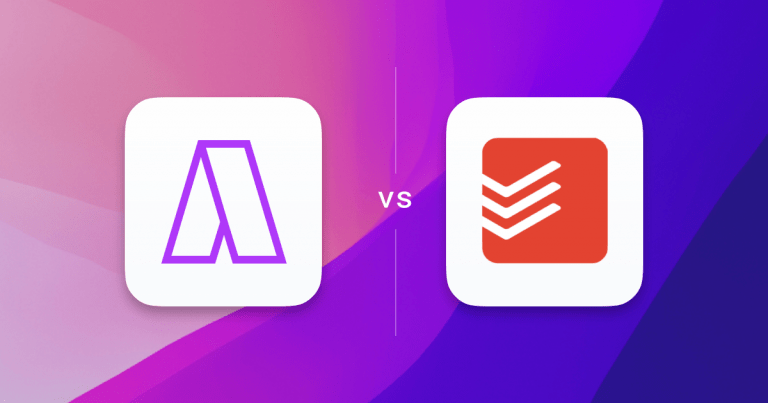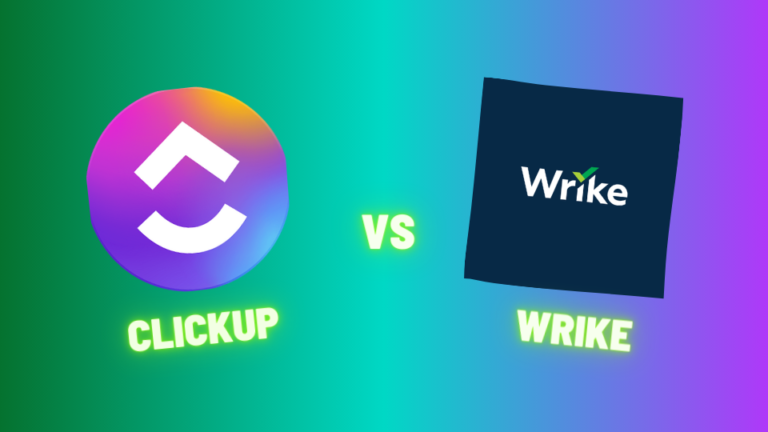What is Clickup
ClickUp is a project management software that stands out for its customizability and flexibility. It’s designed to accommodate both small and large teams, offering an all-in-one productivity tool for effective collaboration and time management. ClickUp is praised for its hierarchy system that includes spaces, folders, and lists, enhancing task organization and real-time communication through comments and chats. It offers a variety of views like Calendar, Board, and Box, along with real-time collaboration features, task automation, and an extensive range of ClickApps for customization.
Key Features of Clickup
- Real-time Collaboration: ClickUp supports team collaboration with features like a whiteboard, comments, chat, and more, enabling efficient real-time communication and idea sharing.
- Customizable Task Management (ClickApps): The platform offers a wide range of ClickApps, similar to add-ons, that allow users to tailor the task management experience to their specific needs, enhancing flexibility and organization.
- Diverse Viewing Options: Users can choose from various views like Calendar, Board, and Box, providing multiple perspectives for managing workspaces and tasks, ensuring that teams can work in the way that suits them best.
- Task Automation: Regular tasks can be automated in ClickUp, saving time and boosting productivity. This feature is especially beneficial for repetitive or routine tasks, streamlining workflow efficiency.
- Comprehensive Dashboard: ClickUp’s dashboard provides a clear overview of projects, including task tracking, goal setting, and team performance insights, helping in effective project management and decision-making.
- Time Tracking Tools: The platform includes time tracking tools that allow for setting estimated times for tasks, aiding in better time management and resource allocation within teams.
What is Wrike
Wrike is a project management software designed to help teams manage their workspace and projects more efficiently. It offers a traditional interface with a wide range of functionalities including tables, boards, Gantt charts, and templates for collaboration across remote, hybrid, and in-person teams. Wrike supports various types of file proofing and integrates well with other tools like Miro, Microsoft Teams, and Slack. It is particularly popular among marketing and sales teams for its resource management and time logging features.
Key Features of Wrike
- Interactive Gantt Charts: Wrike’s Gantt charts allow users to visualize project timelines and dependencies. This feature helps in planning and adjusting schedules with simple drag-and-drop adjustments, facilitating easy management of complex project timelines.
- Real Time Collaboration: Teams can collaborate in real time, with updates and communications happening instantly across the platform. This ensures that all team members are on the same page and can react quickly to changes or updates.
- Customizable Dashboards: Wrike offers fully customizable dashboards that give users control over what data they see and how it’s presented. This helps in tracking the most relevant project metrics and individual tasks, tailoring the view to meet specific needs or roles within a team.
- Integrated Resource Management: The software includes tools for resource allocation and management, allowing managers to oversee team workloads, plan capacity, and distribute tasks efficiently to avoid overloading employees.
- Advanced Security Features: Wrike provides robust security measures, including role-based access control, to ensure that sensitive project data is protected and only accessible to authorized personnel.
- Automation Tools: With Wrike, repetitive tasks can be automated using custom workflows, which saves time and reduces the potential for human error. This feature supports a smoother project flow and improves overall efficiency.

Clickup vs Wrike: Features
| Features | Clickup | Wrike |
|---|---|---|
| Integrations | Gmail, Zoom, Harvest Time Tracking, Unito, Slack, Make, PomoDone, TimeCamp, Time Doctor, LambdaTest, DueFocus, and Twilio | Salesforce, Microsoft Teams, Google Drive, Slack, Adobe Creative Cloud, and Zoom |
| Calendar | Yes | Yes |
| Platforms | macOS, iOS, Android, Web, Windows | Yes |
| Task Management | Labels, tags, recurring tasks, checklists, and task dependencies | Task Creation and Updating, Multiple Viewing Options, Time Tracking, Templates, Comprehensive Task Reports, Task history logging, File Uploads and Sharing capabilities |
| Natural Language Processing | Not mentioned | No |
| Time Blocking | No | Yes |
| Analytics | Yes | Yes |
| Meeting Scheduler | ClickUp integrates with scheduling tools like Google Calendar but does not have a native meeting scheduler. | Yes |
| Time Zones | Yes | Yes |
| Reminders | Yes | Yes |
| Customer Support | Average | Good |
| 1:1 User Onboarding | No | Yes |
| Pricing | Free Plan with basic features, Unlimited at $5/member/month, Business at $12, Business Plus at $19, and a custom-priced Enterprise Plan, each progressively offering more advanced features and functionalities | Free, Professional at $9.80/user, Business at $24.80/user, and Enterprise. Each varies by features and team size |
Clickup vs Wrike: Pricing
Clickup Pricing
ClickUp’s pricing plans include:
(i) Free Plan: Offers essential features for simple task management.
(ii) Unlimited Plan: $5 per member/month, billed annually, for unlimited tasks, integrations, and dashboards.
(iii) Business Plan: $12 per member/month, billed annually, includes advanced features for mid-sized teams.
(iv) Business Plus Plan: $19 per member/month, billed annually, ideal for multiple teams.
(v) Enterprise Plan: Custom pricing, offering advanced security and control for large organizations.
Wrike Pricing
Wrike offers several pricing plans based on the size and needs of teams. Here’s a brief overview:
(i) Free Plan: Designed for teams just starting out, offering basic project management features with limitations on active tasks.
(ii) Professional Plan: Costs $9.80 per user/month, suitable for teams of 2-25 users, offering unlimited projects, tasks, and 2 GB of storage per user.
(iii) Business Plan: Priced at $24.80 per user/month, tailored for larger teams, it includes comprehensive project management tools, automation, approvals, and 5 GB of storage per user.
(iv) Enterprise Plan: For large teams needing enterprise-grade security and scalability, with pricing available upon contact. It includes advanced security features, automation, and 10 GB of storage per user.
(v) Pinnacle Plan: Aimed at teams with complex work needs, offering advanced analytics, 15 GB of storage per user, and premium features, with pricing available upon request.
Clickup vs Wrike: Reviews
Clickup Review
ClickUp is recognized for its customization and flexibility, catering to both small and large teams. It offers a structured workspace with a variety of tools for project management, task management, and real-time collaboration. ClickUp is also appreciated for its dashboard overview and time tracking tools. However, ClickUp can be overwhelming for beginners due to its extensive features and options. Users would need some time to explore and fully utilize all the functionalities ClickUp offers. It’s best suited for teams that require comprehensive project management tools and are willing to invest time in learning the system.
Wrike Review
Wrike is a project management tool praised for its extensive functionality, which is especially beneficial for teams in marketing and sales. It offers a variety of views like Gantt charts, dashboards, and tables which enhance project visibility and management. Wrike integrates well with other tools such as Miro and Slack, making it versatile in different working environments. However, the platform is not without its shortcomings. New users may find it challenging to navigate due to the complexity and abundance of features. The design is more functional than aesthetic, which might not appeal to users who prefer a more modern interface. This could detract from the user experience, particularly when compared to simpler or more visually appealing tools like monday.com or ClickUp. Despite these issues, Wrike remains a solid choice for comprehensive project management needs.
Which One Should You Pick
Consider Clickup if
- You need a customizable tool: ClickUp is suitable for those who value customization in task management but be prepared for a steeper learning curve.
- You seek variety in task views: ClickUp’s multiple views like Board and Calendar are handy, yet they may initially overwhelm new users.
- You prefer integrating with other apps: While ClickUp offers numerous integrations, it might not be as extensive as some other tools, making it suitable for moderate integration needs.
Consider Wrike if
- You Need a Range of Project Management Tools: Wrike might be suitable if you’re looking for a project management platform that includes diverse organizational tools like Gantt charts and dashboards, though it may be more complex than necessary for simpler projects.
- Your Team Requires Collaboration Features: Wrike facilitates collaboration among teams, especially in creative and marketing sectors. However, its interface and wealth of features can be overwhelming for those unused to comprehensive project management software.
- Integration Is Key to Your Workflow: If integrating with other applications like Miro and Slack is crucial, Wrike offers these capabilities, but keep in mind the potential steep learning curve for navigating its extensive feature set.
Best Clickup and Wrike Alternative
Akiflow: Akiflow is a time management app offering time blocking, task scheduling, and integrations with various tools. It focuses on productivity and organization through a unified task and appointment interface.
Akiflow Price: $19 per month, paid annually

Best Time Blocking Web and Desktop Apps, 2024
Explore the best time blocking apps of 2024! Discover how Akiflow, TickTick, Usemotion, Sunsama, Sortedapp, and TimeHero revolutionize productivity, offering unique features for professionals and students to manage tasks and enhance efficiency.

Improve Focus: 5 ADHD Productivity Tools & Calendar Apps for 2023
Discover five of the best apps and tools for those with ADHD, from note-taking apps to time-blocking platforms. Get ready to stay organised, motivated and on track with Akiflow’s essential guide.

The Top 3 Todoist Alternatives (In-Depth Review)
Over 25 million people now use Todoist to stay on track and plan their day. It has expanded rapidly and is now a widely used task manager with seamless integrations into other task and calendar managers like Akiflow. While Todoist is hugely popular among its wide user base, there are now a variety of Todoist […]

